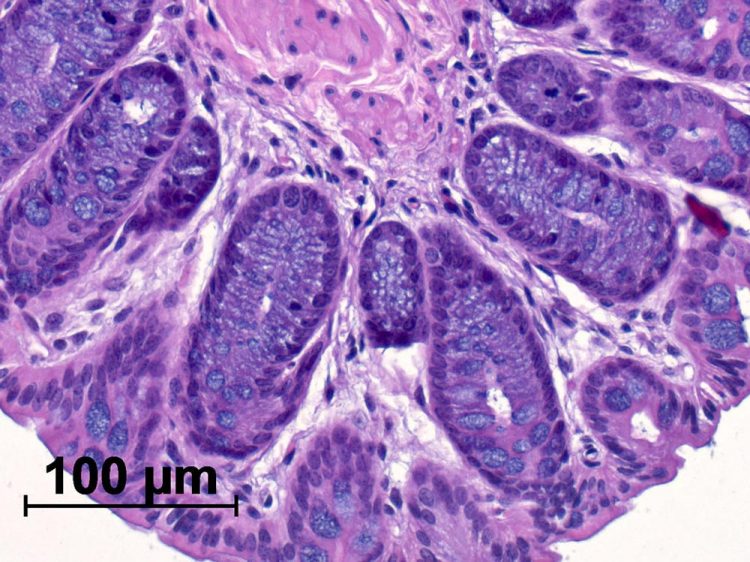Minimising risks of transplants

This image shows sections of the intestinal wall after the activity of particularly aggressive donor lymphocytes is blocked. Experts can clearly see a reduction in inflammation at cellular level, as intestinal crypts are evident as definable rounded or oval structures and only a small number of immune cells (small blue cell nuclei) have migrated into the intestinal tissue. (Image: Kai Hildner)
The severe immune reaction is triggered by a special form of the donor’s immune cells. These so-called T-lymphocytes recognise that the recipient’s cells are foreign and attack them. Researchers at FAU were able to show that this particular form of T-lymphocytes are controlled by a protein named BATF (‘basic leucin zipper ATF-like transcription factor’).
‘The BATF protein acts as a central switch in the donor’s T-lymphocytes,’ explains Prof. Dr. Kai Hildner from the Department of Medicine 1 – Gastroentrology, Pneumology and Endocrinology. ‘If the protein is turned on, it can lead to highly aggressive immune cells being developed, which massively increase inflammatory processes, interacting with other immune cells to cause extensive damage in the intestines after a stem cell transplant.’
The group led by Professor Hildner in cooperation with the Department of Medicine 5 and working groups from Frankfurt, Regensburg and Würzburg were also able to demonstrate another connection: T-lymphocytes from the donor which migrate into the intestines release a messenger substance (GM-CSF – granulocyte-macrophage colony-stimulating factor) which triggers the inflammatory reaction in the intestines. When researchers used medication to prevent these specialised T-lymphocytes from developing and functioning, the inflammation in the intestines disappeared.
The scientists hope that the discovery of this molecular mechanism will lead to new therapies being developed to influence inflammation in the intestines after transplants, further increasing patients’ chances of survival after a stem cell transplant.
They have published the results of their research in the Journal of Clinical Investigation (DOI: 10.1172/JCI89242). Manuscript: https://www.jci.org/articles/view/89242
Further information:
Prof. Dr. Kai Hildner
Phone: 09131 85 -35908
kai.hildner@uk-erlangen.de
Media Contact
More Information:
http://www.fau.de/All latest news from the category: Health and Medicine
This subject area encompasses research and studies in the field of human medicine.
Among the wide-ranging list of topics covered here are anesthesiology, anatomy, surgery, human genetics, hygiene and environmental medicine, internal medicine, neurology, pharmacology, physiology, urology and dental medicine.
Newest articles

A universal framework for spatial biology
SpatialData is a freely accessible tool to unify and integrate data from different omics technologies accounting for spatial information, which can provide holistic insights into health and disease. Biological processes…

How complex biological processes arise
A $20 million grant from the U.S. National Science Foundation (NSF) will support the establishment and operation of the National Synthesis Center for Emergence in the Molecular and Cellular Sciences (NCEMS) at…

Airborne single-photon lidar system achieves high-resolution 3D imaging
Compact, low-power system opens doors for photon-efficient drone and satellite-based environmental monitoring and mapping. Researchers have developed a compact and lightweight single-photon airborne lidar system that can acquire high-resolution 3D…





















